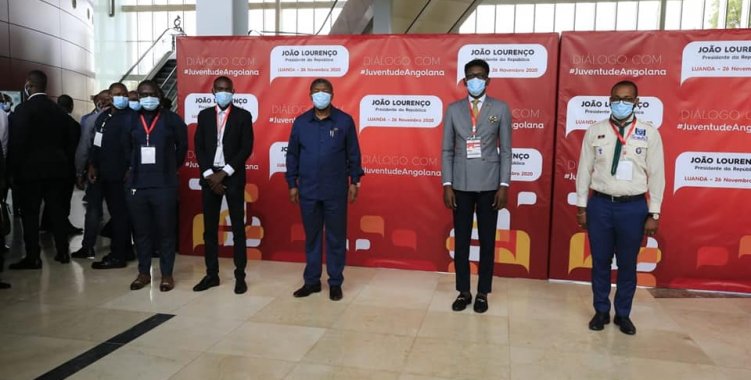Nito Alves, one of the "revus" (young people from the revolutionary movement), said he had come "to dialogue in an ethical way with the President of the Republic", considering it positive that João Lourenço has opened this way.
"My blood spilled on the ground as you saw and my friend was shot dead," said the activist, who was assaulted and had to receive hospital treatment in one of the last demonstrations in Luanda, saying that there will be moments of peace and war.
"Peace is not achieved by crushing the opponent, there will be moments of peace and moments of war that does not mean a declaration of conflict with the government or between us," said the activist.
Nito Alves declared that he will meet with his colleagues and reach a consensus on what to do in the future, considering that "there are people from the musseque, from the suburbs, sitting with the President of the Republic" shows that an "extraordinary step" has been taken in building democracy in the country.
About whether they will call new demonstrations in the street, the silence was recalled, stating only that the demands are public: "We want bread, water, light, health, education, employment and a decent home".
Francisco Teixeira, president of the Movement of Angolan Students and one of the 100 detainees of the October 24 demonstration said he accepted the invitation as the leader of one of the largest student movements in the country, which is part of the National Youth Council, co-organizer of the event.
The leader of the movement stressed the commitment to bring more civic activists to participate in the meeting, which he considered to be at the origin of the initiative.
"Basically, we were the ones responsible for this day because of the street pressure that we did in these last two acts," he said, alluding to the last two attempts to demonstrate, which were harshly repressed by the police.
Francisco Teixeira said that more than the answers João Lourenço can give to young people "the most important thing is that the concerns are met", pointing out problems such as the precariousness of public education, the commercialization of education by many Angolan leaders, violation of children's rights or financing of public schools.
"We want an education where we all fit," he advocated, proclaiming that "a country is only fair, beautiful and beautiful when all citizens fit into it," criticizing "insulting situations such as the payment of an anthem that gave to build three schools".
Asked if the students will return to new protest marches, Francisco Teixeira answered that he will gather the secretariat of the movement "and see if it is worth continuing" depending on the resolution that is given to the problems.
"We can think about giving a moratorium of six months and mobilizing students again for the march, we hope there will be speed and commitment to the resolution of the issues," he suggested.
Another activist, Francisco Matias, better known as Mbanza Hamza, praised, as he left the meeting, "an intelligent president, with a very interesting level of satire and who gives a lot of will to debate".
On further protests, he admitted that "the need to manifest is intrinsically linked to the problems" that are being encountered.
"Whenever it is necessary, we will be on the streets to demonstrate," he promised, calling for Angolans to follow a patriotic rather than partisan orientation.
"There are always alternatives: any one of us can govern," he shot.
About the lack of consensus on participation in the meeting, with activists not willing to attend and others not even invited, Mbanza Hamza referred to bad experiences in the past.
"This reluctance has a history, which relates to the way we are treated and what this history of coming here means. I personally have come to change that, it doesn't mean we are sold out, we have been corrupted or we are cheating, we will stand firm wherever we are and be here to expose our issues to be heard directly," he said.
For the activist this approach gives him more reason to complain if the problems are not solved. "This justifies our struggle more than it weakens it," he said.







